formerly eScholarship Editions


|
|
|
|
Your search for
'American Studies' in subject
found 234 book(s). | Modify Search | Displaying 1 - 20 of 234 book(s) | |
| 1. | 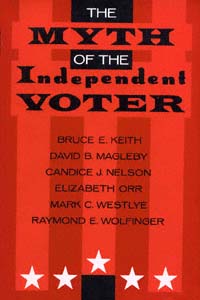 | Title: The Myth of the Independent voter Author: Keith, Bruce E Published: University of California Press, 1992 Subjects: Politics | American Studies Publisher's Description: Few events in American politics over the past two decades have generated more attention than the increasing number of voters calling themselves Independent. By the early 1970s Independents outnumbered Republicans, according to many eminent experts on voting behavior. Yet the authors of this incisive new commentary on American politics claim that most of this widespread speculation on declining party affiliation is simply wrong. They contend that most so-called Independents lean strongly toward one of the two parties and resemble - in all important respects - either Democrats or Republicans. Contrary to expert opinion, only a small segment of voters are truly "independent" of either major party.Based on the most up-to-date 1990 data, The Myth of the Independent Voter provides a roadmap of the political arena for the general reader and scholar alike. Debunking conventional wisdom about voting patterns and allaying recent concerns about electoral stability and possible third party movements, the authors uncover faulty polling practices that have resulted in a skewed sense of the American voting population.Demonstrating that most of what has been written about Independents for more than thirty years is myth, this challenging book offers a trenchant new understanding of the party system, voting behavior, and public opinion. [brief] Similar Items |
| 2. | 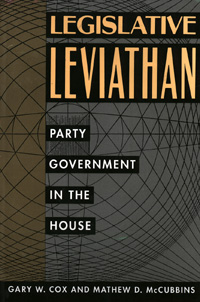 | Title: Legislative leviathan: party government in the House Author: Cox, Gary W Published: University of California Press, 1993 Subjects: Politics | American Studies Publisher's Description: This book provides an incisive new look at the inner workings of the House of Representatives in the post-World War II era. Reevaluating the role of parties and committees, Gary Cox and Mathew McCubbins view parties in the House - especially majority parties - as a species of "legislative cartel." These cartels usurp the power, theoretically resident in the House, to make rules governing the structure and process of legislation. Possession of this rule-making power leads to two main consequences. First, the legislative process in general, and the committee system in particular, is stacked in favor of majority party interests. Second, because the majority party has all the structural advantages, the key players in most legislative deals are members of that party and the majority party's central agreements are facilitated by cartel rules and policed by the cartel's leadership.Debunking prevailing arguments about the weakening of congressional parties, Cox and McCubbins powerfully illuminate the ways in which parties exercise considerable discretion in organizing the House to carry out its work.This work will have an important impact on the study of American politics, and will greatly interest students of Congress, the presidency, and the political party system. [brief] Similar Items |
| 3. | 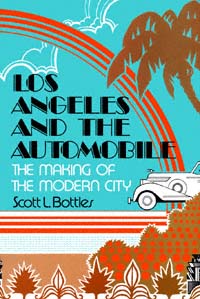 | Title: Los Angeles and the automobile: the making of the modern city Author: Bottles, Scott L Published: University of California Press, 1987 Subjects: American Studies | Californian and Western History | Urban Studies | United States History | American Studies Publisher's Description: More comprehensive than any other book on this topic, Los Angeles and the Automobile places the evolution of Los Angeles within the context of American political and urban history. Similar Items |
| 4. | 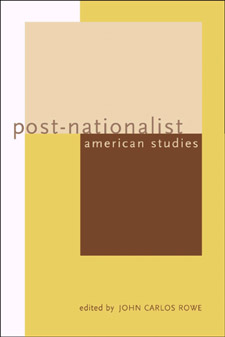 | Title: Post-nationalist American studies Author: Rowe, John Carlos Published: University of California Press, 2000 Subjects: American Studies | Ethnic Studies Publisher's Description: Post-Nationalist American Studies seeks to revise the cultural nationalism and celebratory American exceptionalism that tended to dominate American Studies in the Cold War era. The goal of the book's contributors is a less insular, more trans-national, comparative approach to American Studies, one that questions dominant American myths rather than canonizes them. Articulating new ways to think about American Studies, these essays demonstrate how diverse the field has become. Contributors are concerned with cross-cultural communication, race and gender, global and local identities, and the complex tensions between symbolic and political economies. Their essays explore, among other topics, the construction of "foreign" peoples and cultures; the notion of borders - territorial, racial, economic, and sexual; the "multilingual reality" of the United States; the place of the Mexican-American War in U.S. history; and the significance of Tiger Woods in today's global market of consumption. Together, the essays propose a renewed vision of the United States' role in the world and how American Studies scholarship can address that vision. Each contributor includes a sample syllabus showing how the issues discussed in individual essays can be brought into the classroom. [brief] Similar Items |
| 5. | 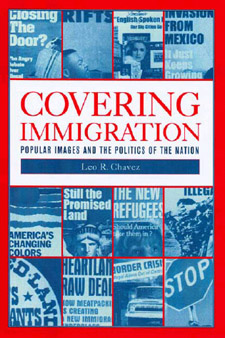 | Title: Covering immigration: popular images and the politics of the nation Author: Chavez, Leo R. (Leo Ralph) Published: University of California Press, 2001 Subjects: Anthropology | Ethnic Studies | American Studies Publisher's Description: On October 17, 1994, The Nation ran the headline "The Immigration Wars" on its cover over an illustration showing the western border of the United States with a multitude of people marching toward it. In the foreground, the Statue of Liberty topped by an upside-down American flag is joined by a growling guard dog lunging at a man carrying a pack. The magazine's coverage of emerging anti-immigrant sentiment shows how highly charged the images and texts on popular magazine covers can be. This provocative book gives a cultural history of the immigration issue in the United States since 1965, using popular magazine covers as a fascinating entry into a discussion of our attitudes toward one of the most volatile debates in the nation. Leo Chavez gathers and analyzes over seventy cover images from politically diverse magazines, including Time, Newsweek, U.S. News and World Report, Business Week, The New Republic, The Nation, and American Heritage. He traces the connections between the social, legal, and economic conditions surrounding immigration and the diverse images through which it is portrayed. Covering Immigration suggests that media images not only reflect the national mood but also play a powerful role in shaping national discourse. Drawing on insights from anthropology, sociology, and cultural studies, this original and perceptive book raises new questions about the media's influence over the public's increasing fear of immigration. [brief] Similar Items |
| 6. | 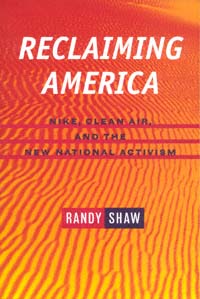 | Title: Reclaiming America: Nike, clean air, and the new national activism Author: Shaw, Randy 1956- Published: University of California Press, 1999 Subjects: American Studies | Politics | Public Policy Publisher's Description: Have activists taken the bumper-sticker adage "Think Globally, Act Locally" too literally? Randy Shaw argues that they have, with destructive consequences for America. Since the 1970s, activist participation in national struggles has steadily given way to a nearly exclusive focus on local issues. America's political and corporate elite has succeeded in controlling the national agenda, while their adversaries - the citizen activists and organizations who spent decades building federal programs to reflect the country's progressive ideals - increasingly bypass national fights. The result has been not only the dismantling of hard-won federal programs but also the sabotaging of local agendas and community instituions by decisions made in the national arena.Shaw urges activists and their organizations to implement a "new national activism" by channeling energy from closely knit local groups into broader causes. Such activism enables locally oriented activists to shape America's future and work on national fights without traveling to Washington, D.C., but instead working in their own backyards. Focusing on the David and Goliath struggle between Nike and grassroots activists critical of the company's overseas labor practices, Shaw shows how national activism can rewrite the supposedly ironclad rules of the global economy by ensuring fair wages and decent living standards for workers at home and abroad. Similarly, the recent struggles for stronger clean air standards and new federal budget priorities demonstrate the potential grassroots national activism to overcome the corporate and moneyed interests that increasingly dictate America's future. Reclaiming America's final section describes how community-based nonprofit organizations, the media, and the Internet are critical resources for building national activism. Shaw declares that community-based groups can and must combine their service work with national grassroots advocacy. He also describes how activists can use public relations to win attention in today's sprawling media environment, and he details the movement-building potential of e-mail. All these resources are essential for activists and their organizations to reclaim America's progressive ideals. [brief] Similar Items |
| 7. | 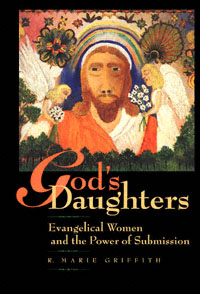 | Title: God's daughters: evangelical women and the power of submission Author: Griffith, R. Marie (Ruth Marie) 1967- Published: University of California Press, 1997 Subjects: Religion | Gender Studies | American Studies Publisher's Description: In recent decades, religious conservatives and secular liberals have battled over the "appropriate" role of women in society. In this absorbing exploration of Women's Aglow Fellowship, the largest women's evangelical organization in the world, R. Marie Griffith challenges the simple generalizations often made about charismatic or "spirit-filled" Christian women and uncovers important connections between Aglow members and the feminists to whom they so often seem opposed. Women's Aglow is an international, interdenominational group of "spirit-filled" women who meet outside the formal church structure for healing prayer, worship, and testimony. Aglow represents a wider evangelical culture that has gained recent media attention as women inspired by the Christian men's group, Promise Keepers, have initiated parallel groups such as Praise Keepers and Promise Reapers. These groups are generally newcomers to an institutional landscape that Aglow has occupied for thirty years, but their beliefs and commitments are very similar to Aglow's. While historians have examined earlier women's prayer groups, they've tended to ignore these modern-day evangelical groups because of their assumed connection to the "religious right." God's Daughters reveals a devotional world in which oral and written testimonies recount the afflictions of human life and the means for seeking relief and divine assistance. A relationship with God, envisioned as father, husband or lover, and friend, is a way to come to terms with pain, dysfunctional family relationships, and a desire for intimacy. Griffith's book is also valuable in showing the complex role that women play within Pentecostalism, a movement that has become one of the most important in twentieth-century world religions. [brief] Similar Items |
| 8. | 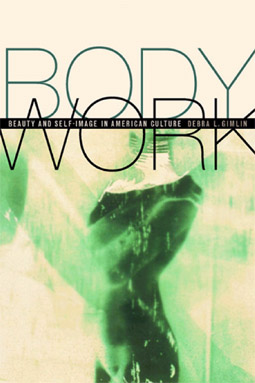 | Title: Body work: beauty and self-image in American culture Author: Gimlin, Debra L 1967- Published: University of California Press, 2002 Subjects: Sociology | Gender Studies | American Studies Publisher's Description: Today women are lifting weights to build muscle, wrapping their bodies in seaweed to reduce unwanted water retention, attending weigh-ins at diet centers, and devoting themselves to many other types of "body work." Filled with the voices of real women, this book unravels the complicated emotional and intellectual motivations that drive them as they confront American culture's unreachable beauty ideals. This powerful feminist study lucidly and compellingly argues against the idea that the popularity of body work means that women are enslaved to a male-fashioned "beauty myth." Essential reading for understanding current debates on beauty, Body Work demonstrates that women actually use body work to escape that beauty myth. Debra Gimlin focuses on four sites where she conducted in-depth research--a beauty salon, aerobics classes, a plastic surgery clinic, and a social and political organization for overweight women. The honest and provocative interviews included in this book uncover these women's feelings about their bodies, their reasons for attempting to change or come to terms with them, and the reactions of others in their lives. These interviews show that women are redefining their identities through their participation in body work, that they are working on their self-images as much as on their bodies. Plastic surgery, for example, ultimately is an empowering life experience for many women who choose it, while hairstyling becomes an arena for laying claim to professional and social class identities. This book develops a convincing picture of how women use body work to negotiate the relationship between body and self, a process that inevitably involves coming to terms with our bodies' deviation from cultural ideals. One of the few studies that includes empirical evidence of women's own interpretations of body work, this important project is also based firmly in cultural studies, symbolic interactionism, and feminism. With this book, Debra Gimlin adds her voice to those of scholars who are now looking beyond the surface of the beauty myth to the complex reality of women's lives. [brief] Similar Items |
| 9. | 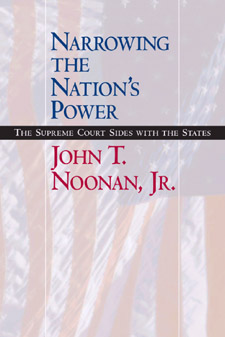 | Title: Narrowing the nation's power: the Supreme Court sides with the states Author: Noonan, John Thomas 1926- Published: University of California Press, 2002 Subjects: Law | American Studies | Political Theory Publisher's Description: Narrowing the Nation's Power is the tale of how a cohesive majority of the Supreme Court has, in the last six years, cut back the power of Congress and enhanced the autonomy of the fifty states. The immunity from suit of the sovereign, Blackstone taught, is necessary to preserve the people's idea that the sovereign is "a superior being." Promoting the common law doctrine of sovereign immunity to constitutional status, the current Supreme Court has used it to shield the states from damages for age discrimination, disability discrimination, and the violation of patents, trademarks, copyrights, and fair labor standards. Not just the states themselves, but every state-sponsored entity--a state insurance scheme, a state university's research lab, the Idaho Potato Commission - has been insulated from paying damages in tort or contract. Sovereign immunity, as Noonan puts it, has metastasized. "It only hurts when you think about it," Noonan's Yalewoman remarks. Crippled by the states' immunity, Congress has been further brought to heel by the Supreme Court's recent invention of two rules. The first rule: Congress must establish a documentary record that a national evil exists before Congress can legislate to protect life, liberty, or property under the Fourteenth Amendment. The second rule: The response of Congress to the evil must then be both "congruent" and "proportionate." The Supreme Court determines whether these standards are met, thereby making itself the master monitor of national legislation. Even legislation under the Commerce Clause has been found wanting, illustrated here by the story of Christy Brzonkala's attempt to redress multiple rapes at a state university by invoking the Violence Against Women Act. The nation's power has been remarkably narrowed. Noonan is a passionate believer in the place of persons in the law. Rules, he claims, are a necessary framework, but they must not obscure law's task of giving justice to persons. His critique of Supreme Court doctrine is driven by this conviction. [brief] Similar Items |
| 10. |  | Title: Refiguring American film genres: history and theory Author: Browne, Nick Published: University of California Press, 1998 Subjects: American Studies | Film | Cultural Anthropology Publisher's Description: This collection of essays by leading American film scholars charts a whole new territory in genre film criticism. Rather than assuming that genres are self-evident categories, the contributors offer innovative ways to think about types of films, and patterns within films, in a historical context. Challenging familiar attitudes, the essays offer new conceptual frameworks and a fresh look at how popular culture functions in American society. The range of essays is exceptional, from David J. Russell's insights into the horror genre to Carol J. Clover's provocative take on "trial films" to Leo Braudy's argument for the subject of nature as a genre. Also included are essays on melodrama, race, film noir , and the industrial context of genre production. The contributors confront the poststructuralist critique of genre head-on; together they are certain to shape future debates concerning the viability and vitality of genre in studying American cinema. [brief] Similar Items |
| 11. | 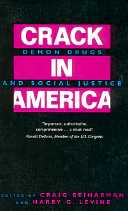 | Title: Crack in America: demon drugs and social justice Author: Reinarman, Craig Published: University of California Press, 1997 Subjects: American Studies | Sociology | Urban Studies Publisher's Description: Crack in America is the definitive book on crack cocaine. In reinterpreting the crack story, it offers new understandings of both drug addiction and drug prohibition. It shows how crack use arose in the face of growing unemployment, poverty, racism, and shrinking social services. It places crack in its historical context - as the latest in a long line of demonized drugs - and it examines the crack scare as a phenomenon in its own right. Most important, it uses crack and the crack scare as windows onto America's larger drug and drug policy problems.Written by a team of veteran drug researchers in medicine, law, and the social sciences, this book provides the most comprehensive, penetrating, and original analysis of the crack problem to date. It reviews the social pharmacology of crack and offers rich ethnographic case studies of crack binging, addiction, and sales. It explores crack's different impacts on whites, blacks, the middle class, and the poor, and explains why crack was always much less of a problem in other countries such as Canada, Australia, and The Netherlands. Crack in America helps readers understand why the United States has the most repressive, expensive, and yet least effective drug policy in the Western world. It discusses the ways politicians and the media generated the crack scare as the centerpiece of the War on Drugs. It catalogues the costs of the War on Drugs for civil liberties, situates crack use and sales in the political economy of the inner cities in the 1980s, and shows how the drug war led to the most massive wave of imprisonment in U.S. history. Finally, it explains why the failures of drug prohibition have led to the emergence of the harm reduction movement and other opposition forces that are changing the face of U.S. drug policy. [brief] Similar Items |
| 12. | 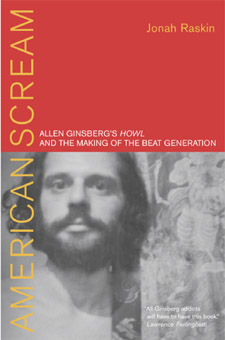 | Title: American scream: Allen Ginsberg's Howl and the making of the Beat Generation Author: Raskin, Jonah 1942- Published: University of California Press, 2004 Subjects: American Studies | Literature | Sociology | Poetry Publisher's Description: Written as a cultural weapon and a call to arms, Howl touched a raw nerve in Cold War America and has been controversial from the day it was first read aloud nearly fifty years ago. This first full critical and historical study of Howl brilliantly elucidates the nexus of politics and literature in which it was written and gives striking new portraits of Allen Ginsberg, Jack Kerouac, and William Burroughs. Drawing from newly released psychiatric reports on Ginsberg, from interviews with his psychiatrist, Dr. Philip Hicks, and from the poet's journals, American Scream shows how Howl brought Ginsberg and the world out of the closet of a repressive society. It also gives the first full accounting of the literary figures - Eliot, Rimbaud, and Whitman - who influenced Howl, definitively placing it in the tradition of twentieth-century American poetry for the first time. As he follows the genesis and the evolution of Howl, Jonah Raskin constructs a vivid picture of a poet and an era. He illuminates the development of Beat poetry in New York and San Francisco in the 1950s--focusing on historic occasions such as the first reading of Howl at Six Gallery in San Francisco in 1955 and the obscenity trial over the poem's publication. He looks closely at Ginsberg's life, including his relationships with his parents, friends, and mentors, while he was writing the poem and uses this material to illuminate the themes of madness, nakedness, and secrecy that pervade Howl. A captivating look at the cultural climate of the Cold War and at a great American poet, American Scream finally tells the full story of Howl - a rousing manifesto for a generation and a classic of twentieth-century literature. [brief] Similar Items |
| 13. | 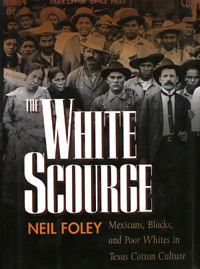 | Title: The white scourge: Mexicans, Blacks, and poor whites in Texas cotton culture Author: Foley, Neil Published: University of California Press, 1998 Subjects: History | Ethnic Studies | American Studies Publisher's Description: In a book that fundamentally challenges our understanding of race in the United States, Neil Foley unravels the complex history of ethnicity in the cotton culture of central Texas. This engrossing narrative, spanning the period from the Civil War through the collapse of tenant farming in the early 1940s, bridges the intellectual chasm between African American and Southern history on one hand and Chicano and Southwestern history on the other. The White Scourge describes a unique borderlands region, where the cultures of the South, West, and Mexico overlap, to provide a deeper understanding of the process of identity formation and to challenge the binary opposition between "black" and "white" that often dominates discussions of American race relations.In Texas, which by 1890 had become the nation's leading cotton-producing state, the presence of Mexican sharecroppers and farm workers complicated the black-white dyad that shaped rural labor relations in the South. With the transformation of agrarian society into corporate agribusiness, white racial identity began to fracture along class lines, further complicating categories of identity. Foley explores the "fringe of whiteness," an ethno-racial borderlands comprising Mexicans, African Americans, and poor whites, to trace shifting ideologies and power relations. By showing how many different ethnic groups are defined in relation to "whiteness," Foley redefines white racial identity as not simply a pinnacle of status but the complex racial, social, and economic matrix in which power and privilege are shared.Foley skillfully weaves archival material with oral history interviews, providing a richly detailed view of everyday life in the Texas cotton culture. Addressing the ways in which historical categories affect the lives of ordinary people, The White Scourge tells the broader story of racial identity in America; at the same time it paints an evocative picture of a unique American region. This truly multiracial narrative touches on many issues central to our understanding of American history: labor and the role of unions, gender roles and their relation to ethnicity, the demise of agrarian whiteness, and the Mexican-American experience. [brief] Similar Items |
| 14. | 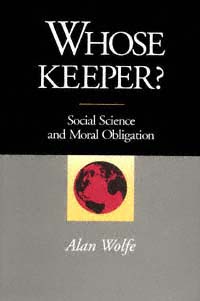 | Title: Whose keeper?: social science and moral obligation Author: Wolfe, Alan 1942- Published: University of California Press, 1991 Subjects: Sociology | Ethics | Politics | American Studies Similar Items |
| 15. | 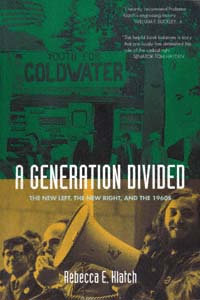 | Title: A generation divided: the new left, the new right, and the 1960s Author: Klatch, Rebecca E Published: University of California Press, 1999 Subjects: Sociology | American Studies | Politics Publisher's Description: The 1960s was not just an era of civil rights, anti-war protest, women's liberation, hippies, marijuana, and rock festivals. The untold story of the 1960s is in fact about the New Right. For young conservatives the decade was about Barry Goldwater, Ayn Rand, an important war in the fight against communism, and Young Americans for Freedom (YAF). In A Generation Divided , Rebecca Klatch examines the generation that came into political consciousness during the 1960s, telling the story of both the New Right and the New Left, and including the voices of women as well as men. The result is a riveting narrative of an extraordinary decade, of how politics became central to the identities of a generation of people, and how changes in the political landscape of the 1980s and 1990s affected this identity. [brief] Similar Items |
| 16. | 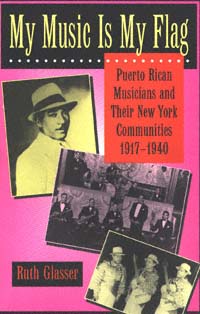 | Title: My music is my flag: Puerto Rican musicians and their New York communities, 1917-1940 Author: Glasser, Ruth Published: University of California Press, 1995 Subjects: History | American Studies | Music Publisher's Description: Puerto Rican music in New York is given center stage in Ruth Glasser's original and lucid study. Exploring the relationship between the social history and forms of cultural expression of Puerto Ricans, she focuses on the years between the two world wars. Her material integrates the experiences of the mostly working-class Puerto Rican musicians who struggled to make a living during this period with those of their compatriots and the other ethnic groups with whom they shared the cultural landscape.Through recorded songs and live performances, Puerto Rican musicians were important representatives for the national consciousness of their compatriots on both sides of the ocean. Yet they also played with African-American and white jazz bands, Filipino or Italian-American orchestras, and with other Latinos. Glasser provides an understanding of the way musical subcultures could exist side by side or even as a part of the mainstream, and she demonstrates the complexities of cultural nationalism and cultural authenticity within the very practical realm of commercial music.Illuminating a neglected epoch of Puerto Rican life in America, Glasser shows how ethnic groups settling in the United States had choices that extended beyond either maintenance of their homeland traditions or assimilation into the dominant culture. Her knowledge of musical styles and performance enriches her analysis, and a discography offers a helpful addition to the text. [brief] Similar Items |
| 17. | 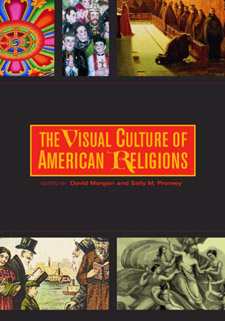 | Title: The visual culture of American religions Author: Morgan, David 1957- Published: University of California Press, 2001 Subjects: Religion | Art | American Studies Publisher's Description: Contemporary artists have often clashed with conservative American evangelicals in recent years, giving the impression that art and religion are fundamentally at odds. Yet historically, artistic images have played a profound role in American religious life. This superb collection of essays, with its unique assembly of images, challenges the apparent tension between religion and the arts by illustrating and investigating their long-standing and intriguing relationship from the early nineteenth century to the present day. The essays explore such varied topics as Sioux Sun Dance artifacts and paintings, American Jewish New Year postcards, the New Mexican santos tradition, roadside shrines, images of journey in African American pictorial traditions, the public display of religion, and the religious use of nineteenth-century technologies of mass reproduction. [brief] Similar Items |
| 18. | 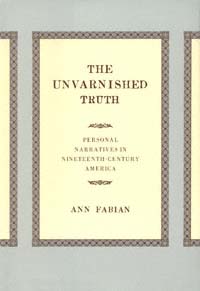 | Title: The unvarnished truth: personal narratives in nineteenth-century America Author: Fabian, Ann Published: University of California Press, 2000 Subjects: American Studies | United States History | American Literature Publisher's Description: The practice of selling one's tale of woe to make a buck has long been a part of American culture. The Unvarnished Truth: Personal Narratives in Nineteenth-Century America is a powerful cultural history of how ordinary Americans crafted and sold their stories of hardship and calamity during the nineteenth century. Ann Fabian examines the tales of beggars, convicts, ex-slaves, prisoners of the Confederacy, and others to explore cultural authority, truth-telling, and the nature of print media as the country was shifting to a market economy. This well-crafted book describes the fascinating controversies surrounding these little-read tales and returns them to the social worlds where they were produced.Drawing on an enormous number of personal narratives - accounts of mostly poor, suffering, and often uneducated Americans - The Unvarnished Truth analyzes a long-ignored tradition in popular literature. Historians have treated the spread of literacy and the growth of print culture as a chapter in the democratization of refinement, but these tales suggest that this was not always the case. Producing stories that purported to be the plain, unvarnished truth, poor men and women edged their way onto the cultural stage, using storytelling strategies far older than those relying on a Renaissance sense of refinement and polish. This book introduces a unique collection of tales to explore the nature of truth, authenticity, and representation. [brief] Similar Items |
| 19. | 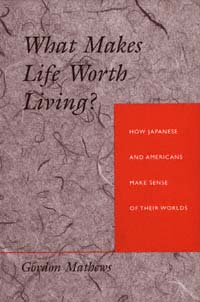 | Title: What makes life worth living?: how Japanese and Americans make sense of their worlds Author: Mathews, Gordon Published: University of California Press, 1996 Subjects: Anthropology | Cultural Anthropology | American Studies | Japan Publisher's Description: Here is an original and provocative anthropological approach to the fundamental philosophical question of what makes life worth living. Gordon Mathews considers this perennial issue by examining nine pairs of similarly situated individuals in the United States and Japan. In the course of exploring how people from these two cultures find meaning in their daily lives, he illuminates a vast and intriguing range of ideas about work and love, religion, creativity, and self-realization.Mathews explores these topics by means of the Japanese term ikigai, "that which most makes one's life seem worth living." American English has no equivalent, but ikigai applies not only to Japanese lives but to American lives as well. Ikigai is what, day after day and year after year, each of us most essentially lives for.Through the life stories of those he interviews, Mathews analyzes the ways Japanese and American lives have been affected by social roles and cultural vocabularies. As we approach the end of the century, the author's investigation into how the inhabitants of the world's two largest economic superpowers make sense of their lives brings a vital new understanding to our skeptical age. [brief] Similar Items |
| 20. | 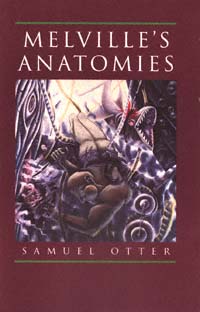 | Title: Melville's anatomies Author: Otter, Samuel 1956- Published: University of California Press, 1999 Subjects: American Studies | American Literature | United States History Publisher's Description: In fascinating new contextual readings of four of Herman Melville's novels - Typee , White-Jacket, Moby-Dick , and Pierre - Samuel Otter delves into Melville's exorbitant prose to show how he anatomizes ideology, making it palpable and strange. Otter portrays Melville as deeply concerned with issues of race, the body, gender, sentiment, and national identity. He articulates a range of contemporary texts (narratives of travelers, seamen, and slaves; racial and aesthetic treatises; fiction; poetry; and essays) in order to flesh out Melville's discursive world.Otter presents Melville's works as "inside narratives" offering material analyses of consciousness. Chapters center on the tattooed faces in Typee , the flogged bodies in White-Jacket , the scrutinized heads in Moby-Dick , and the desiring eyes and eloquent, constricted hearts of Pierre . Otter shows how Melville's books tell of the epic quest to know the secrets of the human body. Rather than dismiss contemporary beliefs about race, self, and nation, Melville inhabits them, acknowledging their appeal and examining their sway.Meticulously researched and brilliantly argued, this groundbreaking study links Melville's words to his world and presses the relations between discourse and ideology. It will deeply influence all future studies of Melville and his work. [brief] Similar Items |